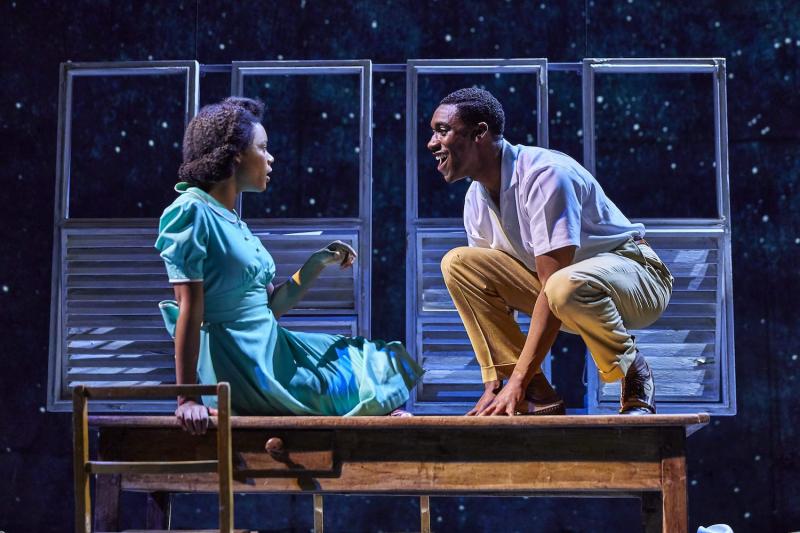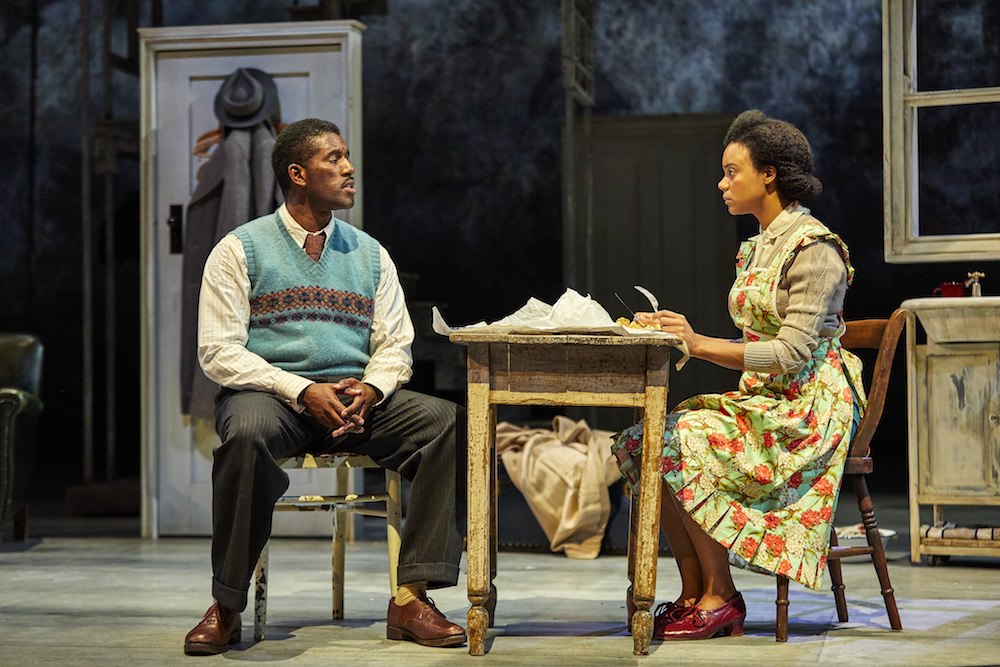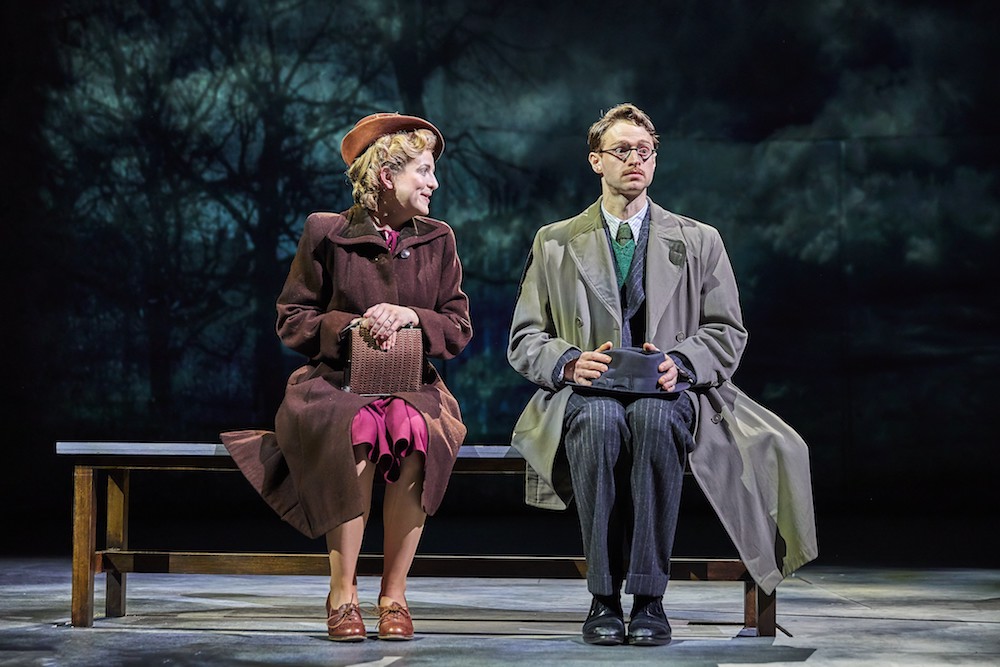Small Island, National Theatre At Home review – big-hearted story hits every beat | reviews, news & interviews
Small Island, National Theatre At Home review – big-hearted story hits every beat
Small Island, National Theatre At Home review – big-hearted story hits every beat
Andrea Levy's Windrush epic bursts triumphantly onto the stage – and our screens

A British-Jamaican man is confused. It's the Second World War, and he signed up for the RAF on the understanding that he would serve as a pilot overseas. But instead he's ended up as ground crew in a grey Lincolnshire village. "You are overseas, aren't you?" sneers his sergeant.
The man is Gilbert Joseph (Gershwyn Eustache Jnr, heartbreakingly strong), who returns to England after the war on HMT Empire Windrush, determined to train as a lawyer. Edmundson sets him up as a narrator alongside the two female leads: Hortense (Leah Harvey, pictured below with Eustache Jnr, witty and wise) and Queenie (Aisling Loftus, steadfast and charming). "I don't come from a place where you do much imagining," Queenie tells us early on, describing her parents' Lincolnshire pig farm. By contrast, Jamaica-born Hortense has dreamed of coming to England for years and is sorely disappointed by the reality of emigrating to "the mother country".
 This tale, as Hortense says, has "deep-down roots", but Norris and a forty-strong cast guide us through it smoothly, hitting every beat of Benjamin Kwasi Burrell's sometimes-playful, sometimes-devastating score. The first third focuses on Hortense's early life in Jamaica; she has her heart broken when her cousin and best friend Michael (CJ Beckford) chooses a white woman over her. Meanwhile Queenie marries Bernard (Andrew Rothney), a man with all the personality of a lukewarm rice pudding, and moves in with him and his father Arthur (David Fielder, stealing the show), a shell-shocked First World War veteran. We move from Jamaica's wide open skies and gorgeous honeyed light (props to lighting designer Paul Anderson) to cold, grubby little Britain – a big old house in Earl's Court, specifically, where Gilbert rents a room from Queenie once he has emigrated. They met in Lincolnshire, where Queenie also came across Michael, completing the narrative loop.
This tale, as Hortense says, has "deep-down roots", but Norris and a forty-strong cast guide us through it smoothly, hitting every beat of Benjamin Kwasi Burrell's sometimes-playful, sometimes-devastating score. The first third focuses on Hortense's early life in Jamaica; she has her heart broken when her cousin and best friend Michael (CJ Beckford) chooses a white woman over her. Meanwhile Queenie marries Bernard (Andrew Rothney), a man with all the personality of a lukewarm rice pudding, and moves in with him and his father Arthur (David Fielder, stealing the show), a shell-shocked First World War veteran. We move from Jamaica's wide open skies and gorgeous honeyed light (props to lighting designer Paul Anderson) to cold, grubby little Britain – a big old house in Earl's Court, specifically, where Gilbert rents a room from Queenie once he has emigrated. They met in Lincolnshire, where Queenie also came across Michael, completing the narrative loop.
The story's geographical scope may have shrunk to just a few rooms by the third act, but the psychological aspect fills the gap, as Gilbert and Hortense try to make the best of things. Their living situation is threatened by the unexpected return of Bernard, missing after his deployment to India during partition. While overseas he discovered a deep hatred of people of colour, but Rothney (pictured below, with Loftus) keeps him from descending into pantomime villainy – which is the whole point, of course.
 Small Island shows us that British racism is immensely varied. It can be cheerful, like Queenie referring to Gilbert as a "coloured chappie", or violent, like her husband's blind rage against their black lodgers. It can be curious – the Lincolnshire villagers ask Gilbert if Jamaica is in Africa, which makes him wonder why they don't know anything about their own empire (why indeed). And it can be eminently well-meaning, as when Arthur mistakes Gilbert for Michael and brings him back to Queenie's farm. It's still racism. The American poet Guante writes, "White supremacy is not a shark. It's the water." The waters here are muddy – they're what binds Jamaica and Britain, but also what divides them. It's the chance to connect with the world, or to turn your back on it.
Small Island shows us that British racism is immensely varied. It can be cheerful, like Queenie referring to Gilbert as a "coloured chappie", or violent, like her husband's blind rage against their black lodgers. It can be curious – the Lincolnshire villagers ask Gilbert if Jamaica is in Africa, which makes him wonder why they don't know anything about their own empire (why indeed). And it can be eminently well-meaning, as when Arthur mistakes Gilbert for Michael and brings him back to Queenie's farm. It's still racism. The American poet Guante writes, "White supremacy is not a shark. It's the water." The waters here are muddy – they're what binds Jamaica and Britain, but also what divides them. It's the chance to connect with the world, or to turn your back on it.
This show was deeply relevant during its original run last year, hot on the heels of the Windrush scandal. Now it's so of-the-moment it takes your breath away. "Am I to be the servant and you the master fi' all time," Gilbert asks Bernard, "because you white?" He's speaking in 1948, but he could just as well have written that question on a placard yesterday.
rating
Share this article
The future of Arts Journalism
You can stop theartsdesk.com closing!
We urgently need financing to survive. Our fundraising drive has thus far raised £49,000 but we need to reach £100,000 or we will be forced to close. Please contribute here: https://gofund.me/c3f6033d
And if you can forward this information to anyone who might assist, we’d be grateful.

Subscribe to theartsdesk.com
Thank you for continuing to read our work on theartsdesk.com. For unlimited access to every article in its entirety, including our archive of more than 15,000 pieces, we're asking for £5 per month or £40 per year. We feel it's a very good deal, and hope you do too.
To take a subscription now simply click here.
And if you're looking for that extra gift for a friend or family member, why not treat them to a theartsdesk.com gift subscription?
more Theatre
 Clarkston, Trafalgar Theatre review - two lads on a road to nowhere
Netflix star, Joe Locke, is the selling point of a production that needs one
Clarkston, Trafalgar Theatre review - two lads on a road to nowhere
Netflix star, Joe Locke, is the selling point of a production that needs one
 Ghost Stories, Peacock Theatre review - spirited staging but short on scares
Impressive spectacle saves an ageing show in an unsuitable venue
Ghost Stories, Peacock Theatre review - spirited staging but short on scares
Impressive spectacle saves an ageing show in an unsuitable venue
 Hamlet, National Theatre review - turning tragedy to comedy is no joke
Hiran Abeyeskera’s childlike prince falls flat in a mixed production
Hamlet, National Theatre review - turning tragedy to comedy is no joke
Hiran Abeyeskera’s childlike prince falls flat in a mixed production
 Rohtko, Barbican review - postmodern meditation on fake and authentic art is less than the sum of its parts
Łukasz Twarkowski's production dazzles without illuminating
Rohtko, Barbican review - postmodern meditation on fake and authentic art is less than the sum of its parts
Łukasz Twarkowski's production dazzles without illuminating
 Lee, Park Theatre review - Lee Krasner looks back on her life as an artist
Informative and interesting, the play's format limits its potential
Lee, Park Theatre review - Lee Krasner looks back on her life as an artist
Informative and interesting, the play's format limits its potential
 Measure for Measure, RSC, Stratford review - 'problem play' has no problem with relevance
Shakespeare, in this adaptation, is at his most perceptive
Measure for Measure, RSC, Stratford review - 'problem play' has no problem with relevance
Shakespeare, in this adaptation, is at his most perceptive
 The Importance of Being Earnest, Noël Coward Theatre review - dazzling and delightful queer fest
West End transfer of National Theatre hit stars Stephen Fry and Olly Alexander
The Importance of Being Earnest, Noël Coward Theatre review - dazzling and delightful queer fest
West End transfer of National Theatre hit stars Stephen Fry and Olly Alexander
 Get Down Tonight, Charing Cross Theatre review - glitz and hits from the 70s
If you love the songs of KC and the Sunshine Band, Please Do Go!
Get Down Tonight, Charing Cross Theatre review - glitz and hits from the 70s
If you love the songs of KC and the Sunshine Band, Please Do Go!
 Punch, Apollo Theatre review - powerful play about the strength of redemption
James Graham's play transfixes the audience at every stage
Punch, Apollo Theatre review - powerful play about the strength of redemption
James Graham's play transfixes the audience at every stage
 The Billionaire Inside Your Head, Hampstead Theatre review - a map of a man with OCD
Will Lord's promising debut burdens a fine cast with too much dialogue
The Billionaire Inside Your Head, Hampstead Theatre review - a map of a man with OCD
Will Lord's promising debut burdens a fine cast with too much dialogue

Add comment